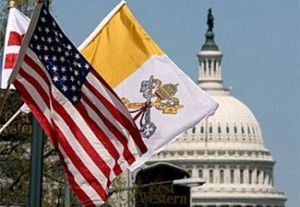 Two new books by thoughtful Catholic authors take deeply different views of the future of American Catholicism. Both deserve serious pondering.
Two new books by thoughtful Catholic authors take deeply different views of the future of American Catholicism. Both deserve serious pondering.
One of them is called Why Catholicism Matters. The subtitle tells it all: “How Catholic Virtues Can Reshape Society in the 21st Century” (Image Books). It’s the work of Bill Donohue, feisty president of the Catholic League for Religious and Civil Rights.
The other volume is Bad Religion, and its subtitle is similarly telling: “How We Became a Nation of Heretics” (Free Press). The author is Ross Douthat, a Catholic who writes an Op-Ed column for The New York Times.
Start with Donohue.
In Why Catholicism Matters, the Catholic League boss, a social scientist with a doctorate who was a college professor before becoming the scourge of anti-Catholics, argues a cheerfully, unapologetically triumphalistic line. He writes:
“If there is one institution that embodies the right recipe for the makings of the good society it is the Roman Catholic Church. Its teachings, especially those that have a public impact, are as well suited to answering today’s social problems as they were two thousand years ago.”
“If only they were followed,” he adds ruefully. Ah, there’s the rub. In two millennia it’s doubtful whether any society anywhere has ever pulled that off consistently and for a sustained period of time.
Bill Donohue isn’t the man to let that discourage him. In fairness, though, it must be said that he isn’t predicting it will happen now but only making the case that it should. From that perspective, Why Catholicism Matters has an important message.
But so does Douthat’s Bad Religion. American Catholicism isn’t his only subject here, but the Church is central to the story he tells. And the story is disturbing.
In brief, it’s this. Orthodox (i.e., traditional) Christianity has faded drastically in America during the last several decades as measured by vanishing cultural impact and “steady institutional decline.” That includes mainline Protestantism, evangelical Protestantism, and Roman Catholicism.
In its place, millions of Americans have embraced various “heresies,” four of which Douthat examines: the “real Jesus” movement represented in the fictionalized fantasies of Dan Brown, the “prosperity gospel,” the “God within” religiosity of pantheistic feel-goodism, and a religious form of hyper-nationalism. The result, Douthat believes, will be a future—possible to the point of being probable—in which “orthodoxy slowly withers and only heresies endure.”
No more than with Donohue’s triumphalism need anyone agree entirely with Douthat’s gloom. But it would be a mistake simply to dismiss either. In the case of American Catholicism, one thing is certain: neither scenario, Douthat’s or Donohue’s, is inevitable. To a great extent, the future is up to us.
Considering how widespread de facto defection from the Church has become, that’s not a comforting thought. What can be done to turn things around? In many cases—probably not much. But in the case of Catholics who practice their faith, part of the answer lies in a much stronger appreciation of what Pope Benedict XVI calls co-responsibility than many laity and clergy now possess.
“Co-responsibility demands a change in mindset,” he says. The laity “should not be regarded as ‘collaborators’ of the clergy but, rather, as people who are really ‘co-responsible’ for the Church’s being and acting.” Then the Church will truly be as it’s depicted in the Acts of the Apostles: “The company of those who believed were of one heart and soul” (4:32).
That’s asking a lot. As Bill Donohue and Ross Douthat make clear, much now depends on it.



